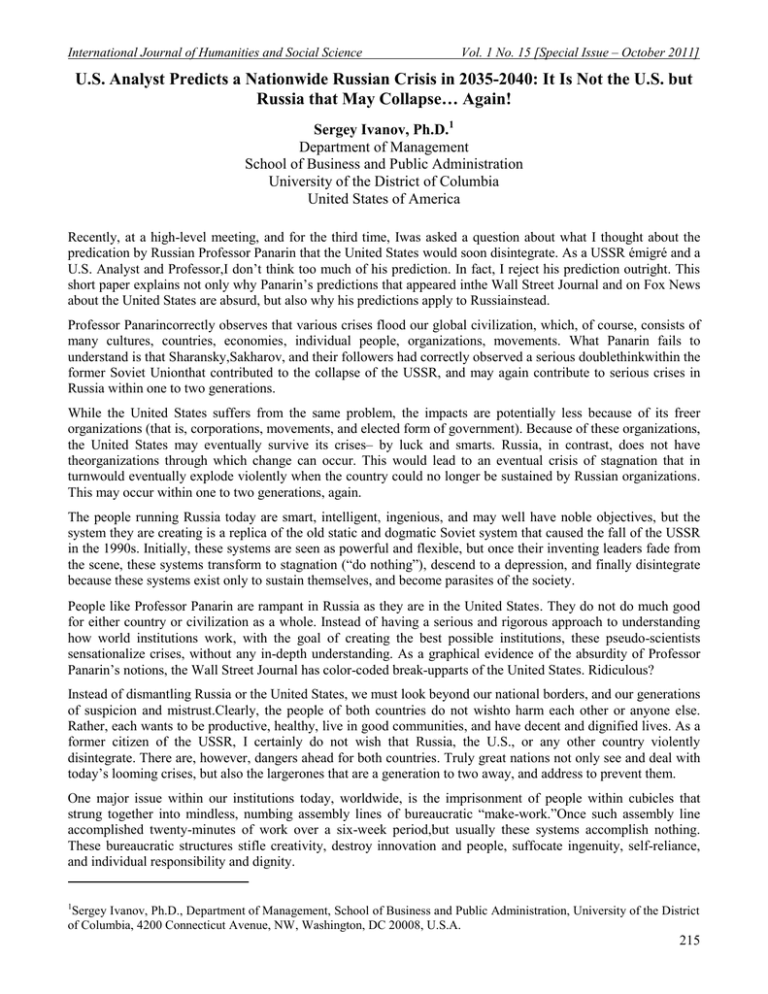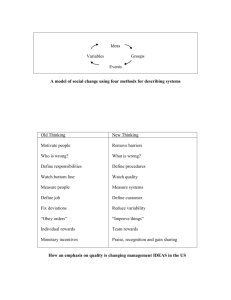Document 10466867
advertisement

International Journal of Humanities and Social Science Vol. 1 No. 15 [Special Issue – October 2011] U.S. Analyst Predicts a Nationwide Russian Crisis in 2035-2040: It Is Not the U.S. but Russia that May Collapse… Again! Sergey Ivanov, Ph.D.1 Department of Management School of Business and Public Administration University of the District of Columbia United States of America Recently, at a high-level meeting, and for the third time, Iwas asked a question about what I thought about the predication by Russian Professor Panarin that the United States would soon disintegrate. As a USSR émigré and a U.S. Analyst and Professor,I don’t think too much of his prediction. In fact, I reject his prediction outright. This short paper explains not only why Panarin’s predictions that appeared inthe Wall Street Journal and on Fox News about the United States are absurd, but also why his predictions apply to Russiainstead. Professor Panarincorrectly observes that various crises flood our global civilization, which, of course, consists of many cultures, countries, economies, individual people, organizations, movements. What Panarin fails to understand is that Sharansky,Sakharov, and their followers had correctly observed a serious doublethinkwithin the former Soviet Unionthat contributed to the collapse of the USSR, and may again contribute to serious crises in Russia within one to two generations. While the United States suffers from the same problem, the impacts are potentially less because of its freer organizations (that is, corporations, movements, and elected form of government). Because of these organizations, the United States may eventually survive its crises– by luck and smarts. Russia, in contrast, does not have theorganizations through which change can occur. This would lead to an eventual crisis of stagnation that in turnwould eventually explode violently when the country could no longer be sustained by Russian organizations. This may occur within one to two generations, again. The people running Russia today are smart, intelligent, ingenious, and may well have noble objectives, but the system they are creating is a replica of the old static and dogmatic Soviet system that caused the fall of the USSR in the 1990s. Initially, these systems are seen as powerful and flexible, but once their inventing leaders fade from the scene, these systems transform to stagnation (“do nothing”), descend to a depression, and finally disintegrate because these systems exist only to sustain themselves, and become parasites of the society. People like Professor Panarin are rampant in Russia as they are in the United States. They do not do much good for either country or civilization as a whole. Instead of having a serious and rigorous approach to understanding how world institutions work, with the goal of creating the best possible institutions, these pseudo-scientists sensationalize crises, without any in-depth understanding. As a graphical evidence of the absurdity of Professor Panarin’s notions, the Wall Street Journal has color-coded break-upparts of the United States. Ridiculous? Instead of dismantling Russia or the United States, we must look beyond our national borders, and our generations of suspicion and mistrust.Clearly, the people of both countries do not wishto harm each other or anyone else. Rather, each wants to be productive, healthy, live in good communities, and have decent and dignified lives. As a former citizen of the USSR, I certainly do not wish that Russia, the U.S., or any other country violently disintegrate. There are, however, dangers ahead for both countries. Truly great nations not only see and deal with today’s looming crises, but also the largerones that are a generation to two away, and address to prevent them. One major issue within our institutions today, worldwide, is the imprisonment of people within cubicles that strung together into mindless, numbing assembly lines of bureaucratic “make-work.”Once such assembly line accomplished twenty-minutes of work over a six-week period,but usually these systems accomplish nothing. These bureaucratic structures stifle creativity, destroy innovation and people, suffocate ingenuity, self-reliance, and individual responsibility and dignity. 1 Sergey Ivanov, Ph.D., Department of Management, School of Business and Public Administration, University of the District of Columbia, 4200 Connecticut Avenue, NW, Washington, DC 20008, U.S.A. 215 The Special Issue on Contemporary Research in Arts and Social Science © Centre for Promoting Ideas, USA Some of our organizations actually pay people not to work while at the same time ask them to be motivated. Despite this situation, most people want to contribute to the betterment of all. They want to fix the system to be the one that actually lets people work, andfree them to innovate, create, and give their best to the organization and society. We have prevented these freedoms through over-layered organizations with many levels of managers, who, themselves, are being micro-managed by those from “above,” and from the very system that they manage. Elliott Jaques discovered this problem in the 1950s, and based on his theory, it is safe to predict a major crisis in Russia by 2035-2040. Why? Because the very system being created in Russia today will imprison its generationswithin the Gulags of new Russian organizations. That is simply because at just about the time Russia reemerges as a global power, it will organizationally stagnate to a major crisis because it will not have founded itself on sustainable and dynamic institutions that continue to inspire generational ingenuity. America, unfortunately, fares no better, and is similarly afflicted. Some argue that the U.S. fundamental constitutional fabric enables and encourages organizational structures and industry-government tensions that support reinvention, reconfiguration, and redeployment, but I do not see a rosy picture for either country. 20352040 Russian crisis will resemble the current U.S. crises of disintegrating industries and organizations, which have stagnated the United States for at least a generation. For Russia to be serious about staying a strong, global, and just long-term power, it must rid itself of people like Professor Panarin, and should re-think itsorganizational systems in such a way that Russian systemsalways outcompete, outperform, and work better than comparable systemsfrom abroad. While Russia may have achieved much today through its brilliant people, it has not built self-sustaining, regenerating infrastructures. Hence, its accomplishments are merely preludes to its fall. References 1) (2008). Russian Scholar Predicts Economic Crisis Will Rip America Apart.FoxNews.com: Fox News. 2) Ivanov, Sergey (2008).Accountabilities of Democracies: Natural Organization of the Accountability Structures in Societies.www.SergeyIvanov.org: (working paper, under copyright). 3) Ivanov, Sergey (2011). Why Organizations Fail: A Conversation About American Competitiveness. International Journal of Organizational Innovation, 4(1), 1-16. 4) Jaques, Elliott (1976). A General Theory of Bureaucracy.London, UK: Heinemann Educational Books. 5) Jaques, Elliott (1996). Requisite Organization: A Total System for Effective Managerial Organization and Managerial Leadership for the 21st Century. Arlington, Virginia: Cason Hall & Co. 6) Osborn, Andrew (2008). As If Things Weren't Bad Enough, Russian Professor Predicts End of U.S..New York, NY: The Wall Street Journal. 7) Sharansky, Natan (1998). Fear No Evil .New York, NY: PublicAffairs. 8) Sharansky, Natan (2006). The Case for Democracy: The Power of Freedom to Overcome Tyranny and Terror.Green Forest, AR: Balfour Books. 9) Stringer, Robin (2008).Russian Professor Says U.S. Will Break Up After Economic Crisis.Bloomberg.com: Bloomberg. 216







